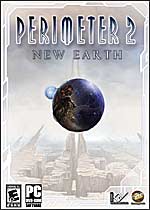Do Not Enter Perimeter
To blandly go where not much has gone before…Perimeter 2: New Earth is a few light-years behind. It’s as though it passed through a wormhole and ended up some 15 years back in time. It’s a buggy, ugly, hodgepodge of a game that is out of place in today’s market. Not only was I not enjoying myself while playing this game, but I was actually getting mad at it. It’s just so sloppy, and you can see evidence of that in the translation, as it toggles between Russian, English, and some kind of made up dialect that combines the two and confounds everyone. The story has little to do with the gameplay, and that’s kind of unfortunate, since it does show some signs of intelligence. All you really have to know is that there are two sides to this story: One race likes land and the other favors water.
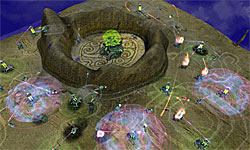
What is interesting is that the game has a different dynamic than most RTS games in that it not only incorporates RPG elements but the entire land and water scenario figure prominently into the gameplay. But what was initially engaging, ultimately becomes routine, causing us to tire quickly of the concept, if not loathe its very existence, as it actually figures too prominently into the gameplay. Allow me to explain.
First of all, let me attempt to relate the premise: Humanity has been exploring strange new worlds for some time now. An inter-dimensional realm was the best that could be found until finally a New Earth was discovered that all could call home. Deemed perfect for habitation, it soon becomes home to two warring factions known as the Exodus and the Harkback. These two groups don’t get along on any principals except the total annihilation of the other group. Even though the two factions are fairly evenly balanced (although there are some issues with that which I will discuss later), they have two major differences. The Exodus prefer to build on land, while the Harkback make their home on water. Depending on which faction you play as, you are going to want to create more water or more land to expand your territory on. Of course, you will also attempt to foil your opponent by withholding their choice or terrain from them.
Terraforming is the system that transforms the battlefield to a liquid or solid. It’s facilitated by energy generators that can be placed virtually anywhere on the map without having to network them. They are independently powered systems. Using resources in the form of psy-crystals harvested from the ground, these energy generators will flood the land with water or cover it with earth. It’s not always imperative that you attempt to secure your faction’s favored terrain on an area of the map that you have secured. Strategically, you may decide to reverse the favored terrain in your enemy’s territory. Each faction will take on damage if the terrain is reversed. While this may seem intriguing, it’s actually a fatal flaw in the game’s overall design, as the gameplay degenerates into a tug-of-terrain war. This could have been a novel concept if its application were more subtle. It’s very easy to win many games by literally turning on the waterworks as soon as possible.
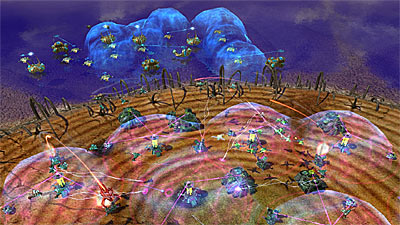
You will still be building bases, gathering resources, and developing new technologies, but at least the level of micromanagement is manageable. Instead of being overly complex, the elements that you are concerned with are limited but can be upgraded. By collecting crystals and other resources, you will be able to increase your weapons and destructive capabilities to the point of acquiring nuclear weapons. It’s quite possible to win a game with one well-placed nuclear attack. With a good source of crystals, you can also quickly create more units, turrets, research buildings, and howitzers and place them in the enemy’s path.
But the game isn’t balanced. With no warning you’ll encounter almost impossible scenarios. Where normally you could just add a bunch of land or throw down a nuclear bomb, suddenly you’ll find yourself in a situation where nothing but the “right sequence of events” will allow you to live after a couple of minutes. Of course, this sequence is predetermined by the CPU, and there’s no way to think your way around it. Trial and error such as this in a RTS game is just not cool.
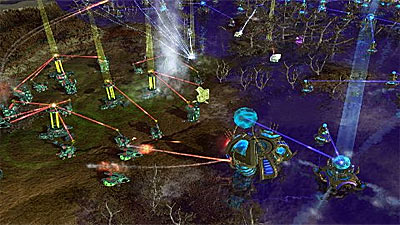
Then of course there is the difficulty of killing the enemy when they decide to “dig in.” They are difficult to see and even more difficult to hit, and when you do manage to make some kills, they respawn so quickly that it becomes overwhelming. What you learn is not to let them get to that point ever again as opposed to being able to develop a strategy that will solve the immediate situation.
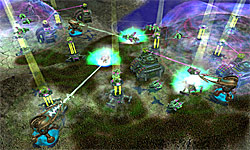
In another example of unbalanced gameplay mechanics, it’s advisable to play as the Harkback since they can always seem to find a more level surface on the water. Craters and other damage to the land, including debris, make finding a pristine flat surface very difficult for the Exodus. There’s really no reason they should be at such a disadvantage.
I did like the simplicity of the interface. It’s clean and easy to access, a necessity when in the heat of battle. Graphically, the game borders on dated and awful. I should just go ahead and say that it’s awfully dated. The maps lack detail with washed out features and blocky structures. This time around, the units lack the imaginative Terminator-liquid-metal morphing as the original – virtually everything in this game has regressed, including the framerate. Voiceovers lack emotion, but it’s obviously something the developers realized so they electronically filtered them to give them an eerie, futuristic, robotic countenance.
As far as the multiplayer mode goes, there is no browser to find a partner looking for a match. But, the good news is that after playing the single-player campaign, you’re unlikely to want to take it any further.
RATING OUT OF 5 RATING DESCRIPTION 2.2 Graphics
Dated graphics. Maps lack detail. Washed out colors. 2.8 Control
Simple interface is easy to use. Gameplay requires too much spamming. 2.5 Music / Sound FX / Voice Acting
Voiceover work is terrible. Sci-fi ambient tunes are good. 2.1 Play Value
Gameplay becomes redundant quickly. It’s very unbalanced. 2.2 Overall Rating – Poor
Not an average. See Rating legend above for a final score breakdown.
Game Features:
